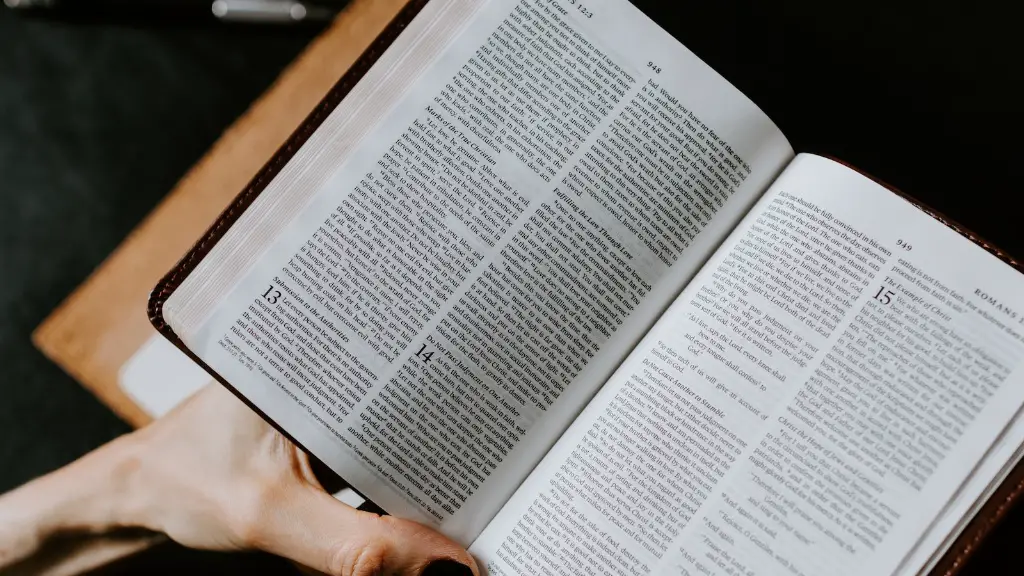What Books Of The Bible Did Moses Write?
Moses’ written works comprise an immense part of the Bible. He is thought to be the author of the first five books of scripture, often referred to as the Pentateuch – Genesis, Exodus, Leviticus, Numbers and Deuteronomy. These works, spanning many chapters long, cover a broad range of topics ranging from theological principles, laws and spiritual instruction to stories of creation, family histories, the Ten Commandments and the beginning of the Israelites’ journey to the Promised Land.
The Pentateuch, or ‘Torah’, is the foundation of Judaism, hundreds of years before the birth of Christ, and is regarded as the most important part of the Old Testament. It is thought to have been composed over a longer timescale than it took for the other books of the Bible to be written, and is said to carry the divine word given to Moses via God, from Mount Sinai. It is thought to be the oldest record of western civilisation and is key to Christianity, as it tells of the beginnings of the Israelites’ journey, their relationship with God and how to draw closer to Him. It is likely that the canon was composed by both Moses and later scribes.
In order to understand the influence of Moses’ work on the Bible, one has to consider the time of composition. The books of Exodus and Deuteronomy were written during a time when the Israelites were wandering in the wilderness. They were not a kingdom, but rather a group of people searching for a homeland. Similarly, during this period of wandering, the laws and religious teachings of Moses were given to the people. These Laws served to provide the people with a unity, an understanding of right and wrong, and ultimately a pathway out of their wandering and into the Promised Land.
The Torah also served to provide a worldview for the Israelites. It provided them with an understanding of their relationship to God and one another, in both physical and spiritual terms. This worldview was important in developing the spiritual beliefs of the Israelites, which ultimately shaped the structure and ways of the kingdom which eventually emerged from the wilderness.
Many experts agree that the five books of the Pentateuch were only written down by Moses’ scribes, likely after his death. Their writing was likely based on oral accounts, by Moses and others, about their learned customs. Until then, their customs were likely passed down orally, meaning Moses could have written some of the books, but not all of them. It is almost certain though, that Moses was the inspiration for the books, as they reflect his theology and his insights into the people of Israel.
Moses had a unique role in the old testament. He was the leader, teacher, and shepherd of the entire nation. As a result, his influence spread far beyond the written word. His teachings and leadership helped develop the people of Israel, setting the path to the Promised Land and, later, the birth of Christ. He was the one who translated God’s word, communicated spiritual truths and provided the foundation for the nation’s faith and acceptance of Him.
How Did The Torah Have Such A Big Influence On Judaism?
The Torah is considered the most important part of Judaism and is seen as an authority on all matters of faith, morality, and everyday life. It is regarded as sacred scripture, not just for the Jews but for all people. The Torah outlines and emphasizes the fundamental principles of Judaism, such as the belief in one God and the adherence to his laws and commandments. It also encourages people to develop a personal relationship with God through prayer and observance of the Sabbath. Additionally, the Torah is said to contain the essence of the Jewish faith, setting the framework for the nation’s interpretation of the world.
The Torah also guides Jews on how to live their lives in accordance with God’s will. It sets out a code of ethical principles which are designed to lead to personal and communal righteousness, such as justice, equality and charity. It also outlines religious rituals and practices including sacrifices, prayers, and feasts. These practices form a strong bond between an individual and the community and help reinforce Jewish identity and deepen the connection with God.
The Torah guides Jews on how to interact with others, both in terms of social justice, charity and compassion and in terms of interpersonal relationships. This includes offering hospitality to strangers, helping those in need, and even treating one’s relatives, friends and enemies with fairness and respect. The Torah also sets out laws governing sexual relations, diet, and Sabbath observance. These laws serve to help Jews self-regulate and stay on the right path.
The Hebrew Bible or Tanakh also includes additional written works by Moses. These include The Song of Songs, Ecclesiastes, and the Book of Job, which all stemmed from Moses’ original writings. The Book of Job is likely the oldest book of the Bible and was written by Moses himself. The Song of Songs is a poem about love and the beauty of God’s creation, and Ecclesiastes is a rumination on the meaning of life and the frailty of human existence.
What Is The Legacy of Moses’ Work?
The legacy of Moses’ work can be seen throughout the Bible and specifically in the five books of the Pentateuch. His teachings have been studied and applied by Bible scholars and religious leaders for centuries and have shaped Christianity and Judaism in profound ways. His wisdom and insight into the nature of God and His people, as well as the lessons he taught regarding righteousness and justice, among others, have been used to guide adherents of both religions and offer comfort and solace.
Moses’ work is also seen in other sacred texts, such as the Talmud. The Talmud is a collection of rabbinic literature and contains commentaries, stories, teachings, and interpretations of the scripture. Though it does not appear in the Bible itself, the Talmud has become a cornerstone for modern Judaism and is said to be the product of Moses’ teachings and those of his religious contemporaries.
Moses’ work is also seen in other cultures and societies, beyond the scope of just the Bible. His teachings on justice and equality resonate with human rights movements around the world, and his work is seen in many contexts such as social justice and civil rights. Additionally, the laws and regulations found in the early part of the Bible have been applied to modern laws, regulations, and systems of government.
How Has Moses’ Work Influenced Future Generations?
The work of Moses is seen in various ways and in various cultures in both the present day and throughout history. In the present day, his work can be seen in the various religions which stem from the Judeo-Christian tradition, particularly the five books of the Pentateuch. It has shaped modern society in terms of governance, law, social justice, and spirituality.
In the past, Moses’ work had an even more profound effect on societies. His laws provided clues and insight into the culture, beliefs, and practices of the ancient world. His writing also set out a moral and religious framework which societies of the time could adhere to and which was adopted by future generations. His work is also thought to have provided cultural continuity and served as a source of comfort and a connection to their past, even as generations evolved.
Moses’ work has also had an influence on literature, particularly in the realm of narrative writing. The stories found in the Pentateuch have shaped the narratives of the world’s most renowned writers and have served as inspiration for countless pieces throughout the centuries. His work has impacted all forms of art, from visual arts, to movie plots and theatre performances.
What Is The Relevance Of Moses’ Work Today?
The works of Moses are still relevant today, as his teachings and writings still provide insight into the nature of God, His love for us, and the importance of righteousness in both personal and communal life. His work is also still studied in various religious contexts, as well as in the academy. Furthermore, his five books of the Pentateuch are still recognized and respected among all of the world’s religions and have become the cornerstone of the Judao-Christian tradition.
Moses’ work also has an influence on literature and popular culture, and his stories still inspire millions of people. He is known around the world as a symbol of resilience and hope, and his presence and words of wisdom still resonate to this day. As such, Moses’ work remains essential to the spiritual, social, and cultural life of the world.
How Has Technology Impacted The Spread Of Moses’ Work?
Technology has had a huge impact on the spread of Moses’ work and other biblical texts. In modern times, the Internet and digital media have made it much easier to access these texts, allowing people to study, learn and engage with them in a variety of ways. This includes videos, articles, podcasts, and e-books which discuss and explore the meaning and relevance of Moses’ work.
In addition, social media platforms have provided a platform for believers to share, discuss and engage with the Bible and its themes in a variety of ways. Additionally, Christian organisations and churches are now using online services to hold services and livestreams of sermons and bible studies, allowing believers to more easily access the teaching of Moses and other biblical writings at home.
Finally, technology has enabled individuals to engage in deeper research and exploration of Moses’ work and other biblical texts. Various online tools and software applications have been designed to aid in in-depth study and exploration. This helps researchers to uncover new insights and gain a deeper understanding of the texts, which then helps to spread Moses’ work even further.





